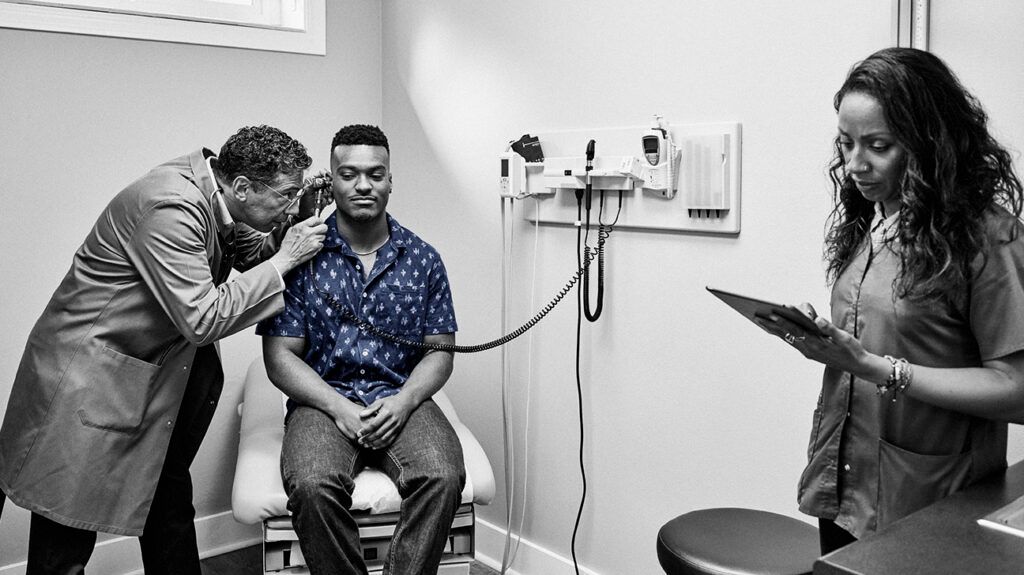Tinnitus is a condition characterized by the perception of noise or ringing in the ears. The two primary types of tinnitus are subjective and objective. Subjective tinnitus is the most common type.
The most common type of tinnitus involves a ringing or noise in the ears with no apparent source, known as subjective or non-rhythmic tinnitus.
In contrast, objective tinnitus, which is usually rhythmic, involves a noise that another person can hear.
This article explains the different types of tinnitus, including their causes, symptoms, and treatment options.

Subjective tinnitus is the
Symptoms
Individuals with subjective tinnitus hear various sounds that can vary in intensity and pitch,
- ringing
- buzzing
- hissing
- whistling
- roaring
Subjective tinnitus can be constant or come and go at irregular intervals. Symptoms can significantly affect an individual’s quality of life, causing stress, anxiety, and sleep disturbances.
Causes
Potential causes of subjective tinnitus
- exposure to loud noises, such as:
- music concerts
- industrial machinery
- firearms
- age-related hearing loss
- excessive earwax buildup, causing a blockage
- fluid buildup due to ear infections
- medication side effects
- injuries to the head or neck
- Ménière’s disease
- blood vessel problems, such as high blood pressure
- acoustic neuroma
- thyroid issues
- B12 deficiency
Treatment
Treatment for subjective tinnitus focuses on managing the symptoms and addressing any underlying causes. Some potential treatment options
- tinnitus retraining therapy (TRT)
- cognitive behavioral therapy (CBT)
- sound masking
- medications
- hearing aids
Objective tinnitus is a relatively rare form of tinnitus in which another person can also hear the sound that the affected person hears.
Symptoms
The most distinctive symptom of objective tinnitus is that a healthcare professional
Causes
Potential causes of objective tinnitus
- any abnormal blood vessel development in the head and neck
- tensor tympani muscle spasm
- palatal myoclonus — a movement disorder that affects the soft palate
- patulous eustachian tube dysfunction
Treatment
Because objective tinnitus usually has an identifiable cause, healthcare professionals
Treatment for an aneurysm
Doctors may recommend medications, lifestyle changes, or physical therapy to treat TMJ disorders.
For tensor tympani muscle spasms, a doctor
Some researchers use the terms rhythmic and non-rhythmic to describe types of tinnitus rather than objective and subjective. However, typically subjective tinnitus is non-rhythmic, and objective tinnitus is rhythmic.
Two specific types of rhythmic tinnitus include pulsatile tinnitus and musculature tinnitus. Both are uncommon and involve pulsating sounds in the ear that may synchronize with the affected person’s heartbeat and blood flow.
If there is an underlying cause, treatment may be able to improve tinnitus symptoms.
Causes
Healthcare professionals may
Potential causes in these categories may include:
- uncontrolled hypertension
- atherosclerotic carotid disease
- blood vessel tumors, such as glomus tumors
- pregnancy
- anemia
Additionally, anything that disrupts the smooth flow of blood through blood vessels near the ear can lead to pulsatile tinnitus.
By examining the symptoms they experience, people can determine which type of tinnitus they have. Subjective tinnitus, which often involves a non-rhythmic noise, is the most common type.
Objective tinnitus may involve a rhythmic sound and can occur due to an underlying health condition.
People should speak with a healthcare professional for an accurate diagnosis and treatment. To diagnose the type of tinnitus a person has, a doctor will carry out a full physical exam.
They
People should promptly contact a doctor if they have tinnitus alongside the following symptoms:
- dizziness
- imbalance
- pain
- changes in vision
If tinnitus is significantly impacting a person’s ability to sleep or causing anxiety, depression, or other emotional distress, they should speak with a healthcare professional for guidance on coping strategies and potential treatment options.
The two main types of tinnitus are objective and subjective, which some healthcare professionals may call rhythmic and non-rhythmic.
If there is an underlying cause, a doctor may be able to treat tinnitus. However, if there is no apparent cause, treatment may focus on relieving symptoms.
People with tinnitus symptoms should contact a healthcare professional for a full diagnosis. A doctor can help a person understand their treatment options.
